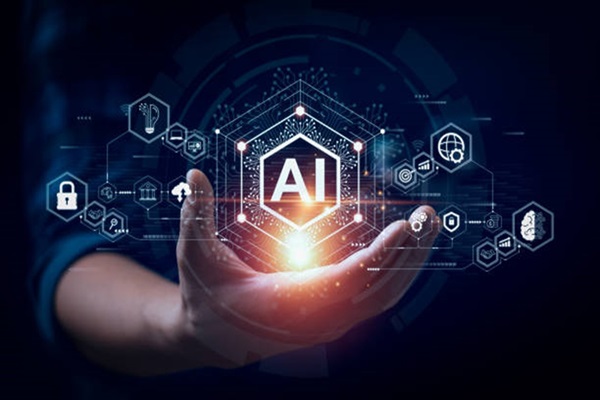
The beginning of the 21st century marked a turning point in human history, as technological innovation soared to unprecedented heights. A silent revolution is taking place, completely transforming the way organizations think and implement their strategies. Amongst these groundbreaking advancements, artificial intelligence (AI) emerged as the driving force behind this digital renaissance as a game-changing power that is revolutionizing the realm of business strategy. This revolutionary change is centred around the incorporation of AI into the core of business operations. From being a mere theoretical concept, AI has evolved into a practical powerhouse that lies at the heart of modern business strategies. By seamlessly incorporating intelligent machines into different aspects of operations, a new era of effectiveness, creativity, and strategic decision-making has been ushered in. This article aims to unravel the profound relevance and implications of AI on business strategy, uncovering pivotal domains where smart machines are igniting transformation and pushing organizations to unparalleled achievements.

By Dr Shathees Baskaran, an Associate Professor at Azman Hashim International Business School, Universiti Teknologi Malaysia. He is an experienced strategic management professional whose major area of interest is strategic management where his intellectual contributions can be found. For more information, visit https://business.utm.my/shathees_intro/
Relevance for Business and Organizations
A Symphony of Algorithms: The Rise of Intelligent Machines.
At the heart of the AI revolution lies the emergence of intelligent automation, a harmonious blend of human creativity and machine accuracy orchestrated by a symphony of algorithms. From streamlining routine tasks to optimizing complex workflows, smart machines are enhancing operational efficiency across industries. The incorporation of robotic process automation (RPA) into business processes serves as a prime example of how AI can significantly improve operational effectiveness allowing human talent to focus on more strategic and creative endeavours. Gone are the days when smart machines were solely found in the realm of science fiction. Nowadays, they are a familiar sight in warehouses, factories, and offices, tirelessly carrying out mundane tasks with unparalleled precision and efficiency, pushing the limits of productivity to new heights.

As we explore the realm of global enterprises, giants such as Amazon and Tesla serve as living proof of the remarkable impact of AI-powered automation. Within their expansive warehouses, an army of robots works hand in hand with human colleagues, creating a harmonious symphony of productivity. This not only speeds up the process of fulfilling orders but also empowers humans to focus on intellectually stimulating and strategic endeavours. The transformative influence of intelligent machines goes beyond mere automation, fostering a cultural revolution where organizations redefine their approach to collaborating with technology.
Unleashing the Power of Big Data: Data-Driven Decision-Making
In today’s digital era, businesses are faced with the dual nature of the influx of data – it can be both a challenge and an opportunity. AI equips organizations with the capability to harness the power of big data through advanced analytics and machine learning algorithms. Amidst this overwhelming amount of information, AI emerges as a guiding light, helping to extract valuable insights from the data overflow. The fusion of AI and big data is revolutionizing decision-making processes, enabling organizations to make informed choices that align with the ever-changing dynamics of modern markets.

Financial institutions are at the forefront of the data revolution, showcasing the interdependence between AI and decision-making. With their ability to process massive datasets in real-time, machine learning algorithms play a crucial role in risk management and fraud detection. By incorporating AI into data analysis, not only does decision-making become faster, but it also enhances the precision and significance of strategic decisions. As businesses navigate the complexities of global markets, the capacity to extract valuable insights from data becomes a pivotal factor in their pursuit of long-term competitiveness.
Crafting Personalized Experiences: The Human Touch of AI
AI has become a formidable advocate for personalization in the realm of customer interactions by enabling personalized experiences at scale. The power to customize experiences based on individual preferences has become a defining characteristic of effective customer engagement, revolutionizing the way consumers and brands interact across various industries. Whether it’s the recommendation algorithms on e-commerce platforms or virtual assistants providing concierge-like services, intelligent machines are crafting a rich tapestry of personalized experiences that deeply connect with the distinct requirements of every consumer. The ability to understand and respond to individual needs is becoming a cornerstone of successful business strategies.

Netflix, the streaming giant, reigns supreme in the world of entertainment with its cutting-edge AI-powered personalization. By harnessing the power of machine learning algorithms, Netflix’s recommendation engine explores users’ viewing habits, preferences, and behaviours to create a tailor-made collection of content. This not only elevates user satisfaction but also fosters a deep sense of loyalty by anticipating and satisfying individual entertainment cravings. The fusion of human intuition and AI’s analytical prowess creates an unstoppable force that not only meets but surpasses customer expectations, paving the way for a revolutionary era of customer-centric business strategies.
Implications for Business and Organizations
Strategic Agility and Adaptability: Navigating the Turbulent Tides.
In the fast-moving world of business, being able to quickly adapt and adjust to changing circumstances is crucial. AI is becoming increasingly important in this regard, as it offers predictive analytics and trend analysis capabilities that can greatly enhance strategic agility. By incorporating AI into strategic frameworks, organizations gain the ability to anticipate challenges and capitalize on new opportunities, even amid uncertainty. Machine learning algorithms explore market trends, consumer behaviour, and competitive landscapes, unearthing invaluable insights for strategic planning. By incorporating AI-powered insights into decision-making processes, organizations can spot emerging opportunities and minimize risks, establishing themselves as pioneers in their respective industries with a forward-thinking approach to adaptability.

In the realm of e-commerce, organizations are constantly grappling with the task of anticipating what consumers want and keeping up with the ever-changing market trends. With AI-powered algorithms, businesses can now probe into extensive datasets that encompass consumer behaviours, market dynamics, and competitive landscapes. By extracting valuable insights from this analysis, organizations gain a strategic advantage that allows them to fine-tune their offerings, marketing strategies, and even supply chain operations in real time. When AI-derived insights are combined with human intuition, it creates a powerful synergy that empowers organizations to not only react to change but also shape their destinies.
Enhanced Productivity and Innovation: A Symphony of Human and Machine Creativity
AI-driven automation not only streamlines operational processes but also fuels innovation. The fusion of human creativity and AI-powered productivity is revolutionizing organizations, taking them to new heights of innovation. With AI handling repetitive tasks and processes, human talent is set free to explore more intellectually stimulating pursuits, fostering a culture of imagination and discovery. The synergy between human creativity and AI-driven efficiency is a powerful combination that propels organizations toward groundbreaking advancements.

Tech giants such as Google exemplify the perfect blend of human ingenuity and machine innovation. In their relentless pursuit of progress, AI is not just a mere tool but a true collaborator. By harnessing the power of machine learning algorithms, which can process massive amounts of data and detect complicated patterns, researchers can ignite their imagination. AI becomes their trusted ally, helping them navigate through vast repositories of information and uncover valuable insights that become the catalyst for groundbreaking advancements. This seamless fusion of human intuition, creativity, and the analytical capabilities of AI results in a remarkable array of innovations that redefine industry standards.
Ethical Considerations and Responsibility: Navigating the Moral Imperative
The issue of bias in AI algorithms, for instance, demands meticulous attention. As AI continues to permeate business strategies, the spotlight is increasingly on ethical considerations and responsibility. Organizations are tasked with grappling with the ethical implications of AI, including challenges like algorithmic bias, data privacy concerns, and the effects on employment. To uphold trust among customers, employees, and stakeholders, businesses must find a harmonious equilibrium between fostering innovation and ensuring responsible AI usage. Additionally, AI applications have the potential to unintentionally worsen societal inequalities if not carefully curated and constantly monitored. Therefore, the pursuit of innovation should always be balanced with a strong sense of ethical responsibility, especially considering the significant impact that AI technologies have on various aspects of society, the economy, and individuals. Recognizing this issue, organizations are now dedicating more resources to ethical AI practices. By addressing the ethical considerations surrounding AI, the organizations not only minimize potential risks but also play a significant role in building a responsible and sustainable AI ecosystem.
For instance, AI is driving remarkable progress in healthcare, transforming diagnostics, drug discovery, and personalized medicine. By harnessing the power of machine learning algorithms, healthcare players can analyze massive amounts of genomic data, paving the way for revolutionary treatment approaches that take into account individual genetic differences. This has profound implications for strategic planning in the healthcare industry, as organizations must navigate the ethical challenges of using genomic data while also seizing the opportunity for groundbreaking medical advancements.
The Future Landscape: Navigating the Uncharted Territories
The AI revolution is far from stagnant. As we find ourselves on the brink of a future moulded by the combination of human intellect and artificial brilliance, the path of business strategy is set to explore unexplored territories by catalyzing a paradigm shift in business strategy. The infusion of AI into corporate strategy marks a revolutionary change that surpasses conventional limits. As we gaze into the horizon of possibilities, the imperative for businesses is clear. From automated intelligence to data-powered decision-making, intelligent machines are revolutionizing how organizations function, compete, and innovate. The strategic impact of AI goes beyond mere enhancements in efficiency, cultivating a culture of flexibility, innovation, and ethical accountability. Organizations that navigate this terrain with a strategic outlook, embracing the game-changing possibilities of AI, are bound to not just endure but flourish in an era where adaptability and innovation hold the key to success. In doing so, organizations not only navigate the currents of change but emerge as architects of a future where the synthesis of human and machine intelligence reshapes the very foundations of business strategy. The future belongs to those who recognize the transformative power of AI, not merely as a tool but as a strategic partner that amplifies human potential.

